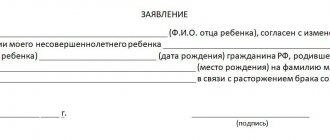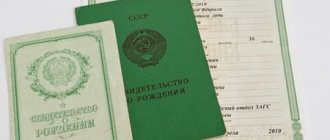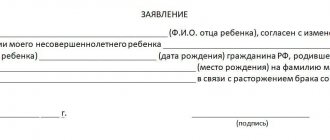What does the law say?
Referring to Chap. 10 of the RF IC , you can find out that at the birth of a child, a man legally married to his mother is recognized as his father. The same rule applies if no more than 300 days have passed since the death of the man or the divorce of the parents.
In the case where a baby was born out of wedlock, the latter is recorded upon a joint application of both parents or in accordance with a decision of a judicial authority. In such a situation, the child’s surname can be maternal, paternal, or double, as the parents decide.
Note! If the father does not recognize the baby, his name and patronymic are written down from the words of the woman who gave birth to him; in this case, the mother’s surname is given. In the case where a woman wants her child to bear the name of the biological father, she will have to establish paternity through the court.
Changing the child's first, last or patronymic name
The law does not prohibit a person from changing his last name, first name or patronymic at any point in his life.
Before the child reaches the age of 14, parents have the right to request permission from the guardianship and trusteeship authority to change the child’s first or last name. The guardianship and trusteeship authority gives permission to parents to change their first or last name only if they are convinced that this does not contradict the interests of the minor child.
In the event of divorce, one of the parents has the right to assign his surname to the child with the permission of the guardianship and trusteeship authority. The parent must also obtain consent from the other parent to change the child’s surname. Consent from the second parent is not required if his whereabouts have not been established, he is declared incompetent by the court or deprived of parental rights.
It is important to know
: when resolving the issue of changing a name or surname, the guardianship and trusteeship authority must take into account the opinion of the child if he is already 10 years old at that time.
Upon reaching the age of 14 years, a minor child has the right to independently change his first name, surname or patronymic. The name change occurs at the civil registry office at the place of state registration of the child’s birth or at his place of residence.
When changing a name, a child under the age of majority must obtain the consent of both parents or guardians.
A name change is subject to mandatory state registration with the civil registry office.
How is a baby registered?
After the baby is born, parents have 1 month to go to the registry office and complete all the documents. If the couple is married, one parent may attend. If a man and woman live together without registering their marriage, both will have to go to the registry office.
If the couple came to the registry office in full force, this means that they both recognize themselves as the parents of the newborn - and are aware of the consequences of this fact. Once the child’s father has filed an application acknowledging his paternity, it will be difficult to challenge it. This can only be done if it can be proven that the man was forced through psychological or physical violence.
To challenge his paternity, a citizen must go to court. There he must independently present arguments and provide the court with a documented reason for abandoning the child.
Bastardy
For a long time, the birth of children, according to ethical standards and moral considerations, was welcomed exclusively after the conclusion of an official marriage. There were exceptions to this rule, but they were condemned by society, which did not contribute to their spread to a wider level. With the advent of new Western trends, this norm was considered obsolete, although today it has not lost its well-deserved relevance. Today, having children without registering a marriage is no longer condemned by society. The state provides comprehensive assistance to single mothers, paying them increased subsidies and financial assistance.
In modern society, the phenomenon of civil marriage has become widespread. This name is assigned to the relationship between a man and a woman who, for one reason or another, have not entered into an official marriage, but despite this live together and run a common household. Civil marriages are zealously defended by certain categories as an institution that has the right to exist. And if the problems with the ethical side of the issue have practically been resolved, then legal norms do not accept or regulate such relations. People who do not want to officially sign are not connected with each other in any way, which means they cannot legally protect their rights. A child born out of wedlock cannot automatically receive the same rights as a child born in a legal relationship.
How not to indicate information about the father?
If the mother of the newborn insists on this, information about the father does not need to be included in the child’s birth certificate. Such cases rarely occur, because after this the child cannot count on receiving alimony or any other help from his father.
If, some time after the decision is made, the mother nevertheless decides to enter information about the child’s father, a new certificate will be issued for him. But the procedure will take time.
Note! If information about the father was not indicated, but after a while he wants to change this situation, and the parents’ marriage was never registered, the biological father of the newborn must establish the fact of his paternity.
State registration
State registration of paternity is carried out in two ways:
- Based on the voluntary establishment of paternity, entered into an act record at the request of the man himself.
- According to a court decision presented by one of the parties to the registry office.
In both cases, the birth certificate undergoes changes and appropriate adjustments are made to it. Information about the father is entered in the appropriate column. If necessary, the surname assigned to the child at birth out of wedlock and/or patronymic is changed.
This procedure can be avoided if the second parent expresses a desire to enter his data during the initial registration of the baby’s birth certificate.
Voluntary consent
If both parents agree that the man will be registered as the father of the child, they need to:
- before the birth of the baby, contact the registry office with a statement that this man is the biological father of the unborn child;
- after the baby is born, the man must write to the registry office a statement that he recognizes his paternity (if he does not have a passport, another ID card will do).
Note! There are no specific deadlines for acknowledging paternity.
The procedure for assigning a surname to a newborn
Every child has the right to a first name, patronymic and last name. Officially, they are assigned to the baby when registering the birth with the civil registry office (upon receipt of a birth certificate).
The issue of assigning a surname to a child is legally regulated by the Family Code of the Russian Federation and Federal Law No. 143 “On Acts of Civil Status”. These documents state that the child bears the surname of his parents. However, exactly whose last name can be given to a newborn depends on a number of circumstances.
How to register a newborn?
The birth of a baby already brings a lot of trouble to parents. And in order to register it, you will need to perform a number of activities that will require time and nerves.
Specifically, we are talking about the following steps:
- After the baby is born, you must obtain a medical certificate. It will be the basis for its registration.
- Parents need to write a paternity statement together. But sometimes this is difficult for various reasons: the man may be in prison or temporarily living abroad. In this case, parents write statements separately. The signature of someone who cannot be present in person is verified by a lawyer.
- Parents must go to the Civil Registry Office building to register their child. Along with the application, you must submit copies of passports and a receipt for payment of the state fee for establishing paternity. If the child has already been registered or has been issued a birth certificate, the documents must be accompanied by a new certificate.
In cases where the parents are not married and the father is in no hurry to acknowledge his paternity, the mother will have to give the child her last name. It can be changed later when the court establishes paternity.
Paternity Establishment Procedure
Recognition of the father's status is carried out at the registry office. If the cohabitant agrees to recognize the baby, he can come there with the mother and submit the necessary application.
The registry office employee enters him in the “father” column on the birth certificate.
This process is widespread, takes little time and is automated. Before the law, the father officially becomes the representative of his children and bears responsibility for them - both moral and material.
To establish paternity at the registry office, you need to submit a joint application with the child’s mother in form No. 12, a check for payment of the state fee, the amount of which is 350 rubles, and a passport of the father and mother.
Paternity can also be registered through the government services portal. Its establishment is carried out simultaneously with the registration of the birth of the baby. If a joint application was submitted to the Civil Registry Office during pregnancy, a new application will not be required. A record of the parents will be made after the birth of the baby. A birth certificate is issued free of charge.
Important! The sample application to establish paternity is no different from the form provided at the registry office.
An identification document, a receipt for payment of the state fee, and a joint statement from the father and mother to establish paternity are sent electronically. Then a time is set for a personal visit to the registry office in order to check the documents. In both cases, registration is simple and does not take much time.
Surname of illegitimate child
Children from birth receive the right to a first name, surname and patronymic . But the question arises: what will be the surname of a child born out of wedlock? The baby receives a first name by agreement of the parents, a middle name in accordance with the father’s name, and a last name is also determined by the parents.
The surname is given to the baby when registering his birth at the registry office. Next, a birth certificate is issued, where this information is indicated. The child is given the surname of the father or mother, unless the law provides for another procedure for obtaining it. In the absence of an agreement between the parents, the child’s surname is recorded in the birth certificate at the direction of the guardianship and trusteeship authority.
The father's surname is assigned to the baby when submitting a written application for recognition of paternity. The mother must confirm her consent.
The father can file an application alone in the event of the death of the mother, her disappearance, deprivation of her parental rights or incapacity. He himself decides what his first name, patronymic and last name will be.
Attention! In 2021, changes were made to the Family Code of the Russian Federation, which states that children can receive a double surname. It consists of the surnames of father and mother. Last names are added in any order using a hyphen.
If it happens that the child is without parents, his full name is given to him by his legal representatives.
Forced Consent
Not all men are ready to take responsibility for their actions and admit their own paternity. The reasons can be very different: from reluctance to pay child support and help the child until he reaches adulthood, to doubts about whose child it is. In this case, the mother must defend her rights - and the rights of the child - in a legal authority. The first thing a woman needs to do is go to the court at her place of registration to file a claim. There she will write a statement establishing paternity.
You will need to attach the following documents to it:
- A copy of the mother's passport.
- A copy of the child's birth certificate.
- Certificate of the child’s place of residence.
- Proof of a relationship between a man and a woman. This could be joint photos, videos, correspondence, testimony, and so on.
Next, the court must check whether the above-mentioned citizen is really the father of the child. To do this, he orders a DNA examination. The baby's potential parent has the right to refuse the procedure, but the court will interpret this as an acknowledgment of paternity.
After receiving the results, the court issues its verdict. If he recognizes this man as the father, appropriate changes will be made to the child’s documents - information about the parent.
Parents are not married
If the mother and father live in a so-called civil marriage (without registration with the registry office), then the fact of recognition of paternity is important. Upon receipt of a birth certificate, a man must acknowledge paternity by submitting an appropriate application. In this case, he is vested with all parental rights, including giving his last name to the baby or, by agreement with the mother, assigning her last name.
If a man denies paternity, it is impossible to give the biological father’s surname to the child without his knowledge and consent. The child’s surname is assigned according to the mother’s surname in accordance with clause 5 of Art. 58 of the RF IC and clause 5 of Art. 18 Federal Law No. 143.
Attention: The mother has the right to file a lawsuit to establish paternity. Thus, the court can oblige the man to fulfill parental obligations.
How to choose a first name, middle name and last name?
Married parents must choose a name for the child and decide what surname and patronymic he will bear. They must do this together.
There are certain rules governing this choice:
- The name must be agreed upon by both parents.
- If the name is offensive or immoral, the civil registry office may refuse to include it on the child's document.
- The middle name must be written using the name of the child's father.
- The surname must belong to either the father or mother of the child. You can combine them - then he will have a double surname.
If the parents cannot come to a mutual decision regarding the name, patronymic or surname, the dispute must be resolved by the guardianship authorities. They should also be contacted if parents want to give their child a unique name that is not in the name directory.
Note! If the marriage is not registered, the child's mother chooses the name. The rest of the data is also set by it. The biological father has no right to influence her decision or name the child himself.
Is it possible to register paternity without marriage?
Recognition of family ties between a child and his parents does not always occur automatically. Thus, paternity outside of marriage is required so that the baby receives legal status and all related rights, including in matters of inheritance.
Recognition procedure
The procedure for recognizing paternity outside of marriage is carried out on the basis of an application from the parents submitted jointly. Sometimes this can be difficult. For example, when one of the partners is away. In this case, it is worth taking care of everything in advance and taking legally necessary actions during pregnancy.
The father can issue a certificate of paternity in a civil marriage (after submitting an application) without the woman’s consent, but with the permission of the guardianship and trusteeship authorities. This is provided for in the event of the death of the mother or her disappearance or imprisonment.
Unregistered cohabitation differs from legal cohabitation in that in the latter case there is a presumption of automatic assignment of paternal status to the current spouse during marriage or within 300 days after divorce. In this case, at the request of the mother, a dash can be placed in the “Father” column (if the divorced mother does not want to indicate the previous spouse) or another person can be indicated.
A man can object to the process of establishing paternity and challenge it in court, but until the court's decision is announced, he will still remain the father legally.
Sample application
Below is a sample application to establish the status of the father.
To register paternity for your child out of wedlock, you need (options):
- file a lawsuit;
- report to the guardianship authorities (if the father applies);
- fill out an application when issuing a birth certificate.
Proving kinship in cohabitation can only be done using the methods listed above.
Father's rights
Parents, both in a civil marriage and in a legal marriage, have the same responsibilities and rights in relation to the child. Children can be taken from places of education, consent to their treatment, etc. The relationship between parents (recorded on the birth certificate) and children does not depend on registration or lack thereof.
Registration of benefits by father
Maternity benefits are intended only for the mother. But the father has the right to other types of benefits, for example, a lump sum at the birth of a baby. This is 18,004.12 rubles, excluding regional coefficients. You must provide the employer with a certificate from your place of employment stating that this type of benefit was not previously assigned.
A monthly payment for caring for an infant up to 1.5 years old is available to both the mother and other close relatives, including the father. In this case, the latter must work under an employment contract and have insurance in the OSS system. It will be necessary to take out parental leave provided for in Art. 256 of the Labor Code of the Russian Federation (you can take it in parts and exchange it with one of your other relatives).
Is it possible to change a child's last name?
The law allows changes to the personal data of children and adults. This applies to first name, last name and patronymic. True, the procedure is complicated and there is no guarantee that the application of the interested party will be satisfied.
The procedure for changing the full name of children is regulated by the Family Code of the Russian Federation (Article 59).
Consequences of changing a surname
Changing personal data is usually associated not with whim, but with necessity. For example, when, upon adoption, new parents want to give their child their family name and patronymic. In this case, the applicant needs to be prepared for the following nuances:
- All of the child's legal documents will have to be changed. This applies to a foreign passport, property rights to real estate or transport, and deposits held by children in financial institutions.
- The need to submit a copy of the certificate of change of surname to all authorities attended by children: school, clubs, sports clubs.
- The impossibility of subsequently taking the surname back (for example, when a court decision on adoption is annulled).
- Difficulties in proving family ties in inheritance. To receive material benefits after the death of close relatives (by law, but not within the framework of a will), it is not easy to confirm the legality of claims to material assets.
Possible problems if mother and child have different surnames
If the child and mother have different last names, difficulties may arise after divorce or the death of the father. First of all, the problems will be related to the obviousness of the family connection.
To avoid this, you need to enter information about the newborn in the mother’s passport in the “children” column. This can be done at the passport office by presenting the child’s birth certificate. Difficulties may arise when contacting various authorities. Therefore, you should have with you a complete package of documents that confirms the change of surname by the mother and the fact of the relationship with the child. The following documents are required as confirmation:
- Child's birth document.
- Divorce document with a note about the mother's change of surname.
- Marriage document if the mother got married again and changed her data.
- A marriage certificate received from the registry office, which confirms the existence of a marriage relationship in the past.
In the case of different surnames of the mother and child, there may be problems when traveling abroad with a minor. In such a situation, you should also carry documents with you that confirm the existence of a relationship.
To avoid additional difficulties, you need to have an official translation of the child’s birth certificate. This can be done at the consulate of the country you plan to visit. Thus, if parents have different surnames, then the child can receive the surname of either mom or dad.
If at the time of the birth of the child the mother and father are not in an officially registered marriage, then the newborn can be given the father’s surname. To do this, the father must write a statement of paternity, on the basis of which information about him will be included in the child’s birth document. If a parent does not recognize his paternity, this can be done in court, in which case the child can also receive the father's surname.
Is it possible to give a child the mother's maiden name?
Married
Based on the requirements of the legislation of the Russian Federation, and specifically the provisions of the Family Code regulating these actions (Article 58), a child born in marriage is assigned the surname of the parents.
If the parents have different surnames, then the following options may exist:
- the baby receives his father's surname;
- the mother's surname is assigned;
- The child can be assigned a double compound surname, consisting of the full father’s and mother’s names in any order, separated by a hyphen.
But whatever option is chosen, it must be based on complete agreement reached between the parents.
In a situation where parents are irreconcilable and could not come to mutual understanding in resolving this issue, their disagreement can only be resolved officially through a private appeal to the guardianship authorities, which protect the civil rights of children.
In this, although not often encountered, case, in which it concerns the need to change an already assigned surname, one should turn to Article 59 of the same code regulating family law.
In accordance with the content of this article, parents have a real right to change the surname that the child now bears until the latter turns 14 years old, but only if they wish together.
This development of the situation is also carried out only after an official application to the local guardianship authorities, in which competent persons will consider the application and make a decision, taking into account the interests of the child.
As soon as the child turns 14 years old, he can change his personal data on his own, but to do this he will still need written, notarized permission from both parents, or he will have to personally file a corresponding claim in court.
After divorce
When the parents stop living together and the child remains with the mother, who already lives under her maiden name, then often a woman who has decided to live without her husband decides to change the surname previously recorded in the birth certificate for her baby. Such a desire is also feasible, but with the consent of the other parent and taking into account the interests of the child.
There are a number of situations when a change of surname can be made without taking into account the presence or absence of the consent of the second parent:
- his whereabouts are unknown;
- if he is limited in parental rights or even deprived of them;
- is incapacitated;
- does not take direct part in raising the child or avoids supporting him by any means.
Is it possible to give a child the mother's last name?
The procedure for assigning a baby’s full name after birth is regulated by the legislation of the Russian Federation, in particular, the Family Code. It will depend on whether he was born in wedlock, and if not, then whether he is recognized as the father. In any case, it is always possible to give the child the mother's surname, the only difference is that in the case of legal marriage or recognition, it will be necessary to choose. If the baby was born to a single mother, and his father has not been identified by law, then there will be no choice, and he will be registered under the mother’s last name.
Registration of a newborn must be carried out according to all the rules, so that later there is no need to change anything. Although, if it arose, for example, due to a divorce, this can be done, but it will require some effort to formalize it.











